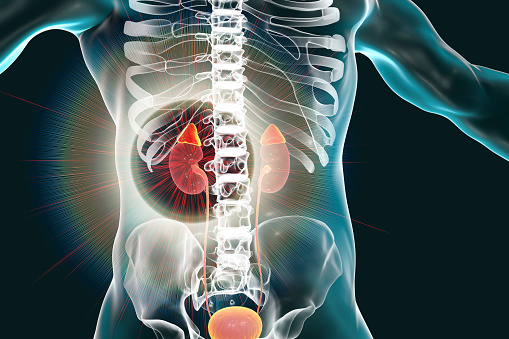How do I know if my kidneys are doing fine? Checking your kidneys is important for your overall health. Here are some kidney function tests:
Urinalysis: One of the most important things a urine test can tell you about your kidney health is whether there are high levels of blood, high levels of protein, or high levels of certain chemicals in your urine.
Blood Tests: Serum creatinine, also known as creatinine, is a waste product your kidneys filter out of your blood. High levels of creatinine can be a sign of kidney problems.
Other specific blood tests include eGFR or Estimated Glomerular Filtration Rate. eGFR measures how well your kidneys filter waste from your blood. Your doctor will use these blood tests to evaluate your kidney function.
Blood Pressure Monitoring: One of the most common causes of high blood pressure is kidney disease.
If your blood pressure is consistently higher than the recommended levels, it’s important to take regular blood pressure tests and seek medical advice.
Imaging: In certain circumstances, imaging studies such as ultrasound, CT scan, or magnetic resonance imaging (MRI) may be performed to visualize the kidneys and detect structural abnormalities or obstructions.
Lifestyle Factors: It is recommended to maintain a healthy lifestyle in order to protect the kidneys.
This includes maintaining adequate hydration levels, consuming a balanced diet, reducing salt intake, engaging in regular physical activity, and abstaining from excessive consumption of alcohol and tobacco.
Medical History and Physical Examination: Your healthcare provider may inquire about your medical background and carry out a physical exam to detect any signs and symptoms of renal disease, including swelling (e.g., edema), urination changes, or pain in the kidney region.
Risk Factors: Your healthcare provider may require more frequent monitoring of your kidney function if you have pre-existing risk factors for renal disease, including diabetes, hypertension, a familial history of renal disease, or a prior history of medications or infections that may interact with the kidneys.
FAQs Related To How do I know if my kidneys are doing fine
How can I check my kidneys are working fine at home?
Home test kits and home urinalysis devices that are compatible with smartphones are available to assess renal function in the home.
A simple urine test is recommended, as albumin is typically not present in urine.
What color is urine when your kidneys are failing?
Red, brown, and purple
Where is kidney pain felt?
Diarrhea of the kidneys is typically located in the lower back, beneath the ribs, and along either side of the spine.
What does stage 1 kidney disease feel like?
High blood pressure
Can kidney disease be cured?
Chronic kidney disease is a condition in which there is no cure for the condition. However, if the disease is in its early stages, there are steps that can be taken to prolong the life of the kidneys.
What does kidney pain feel like?
Pain in the abdominal region, such as in the sides, under the rib cage, or in the abdomen. Pain that is severe or acute, with waves of pain. Pain that extends to the genital area.
Can kidneys repair themselves?
Yes. The kidney cells are able to regenerate under induced conditions.
Does clear pee mean your kidneys are good?
The most common cause of clear pee is excessive water intake. However, it can also be a sign of underlying medical conditions.
In addition to excessive water intake, the most common reasons for clear urine include kidney problems, diabetes mellitus (diabetes), medications, and pregnancy.
How do you get a kidney infection?
A kidney infection is caused by a bacterial infection of the kidneys. Most commonly, kidney infections are caused by E. coli bacteria that live in the intestines.
Which medicine is best for kidney pain?
Can kidney pain come and go?
Yes, it may come and go
How quickly does kidney disease start?
It can start in less than a few days
How long does it take for kidneys to heal?
It can heal for several weeks to months
Can I live a normal life with kidney disease?
Many people with chronic kidney disease are able to live a long and healthy life without being significantly impacted by the disease.
Which exercise is best for kidneys?
Yes. Pick an activity that you can do all the time. Walk, swim, bike (inside or outside), ski, aerobic dance, or any other activity that requires you to engage large muscle groups all the time.
A Word From GetMe Treated
It is essential to be aware that kidney disease may progress undetected in its earliest stages, thus necessitating regular examinations and tests.
If you are uncertain about the state of your kidneys or are at risk of developing kidney disease, it is recommended that you seek advice from a healthcare professional.
They can evaluate your individual circumstances and suggest the most suitable tests and monitoring measures based on your medical history and any potential risk factors.
Prompt detection and treatment of kidney problems can help to prevent or delay the development of kidney disease.
Other Helpful Blog Posts:
- Bright Yellow Urine Diabetes
- 9 Ways To Get Rid Of Back Pain For Good
- 7 Signs That Explain You’re Eating Too Much Salt
- Chiropractor For Leg Pain
- How To Reduce Inflammation During Menopause
- 12 Simple Ways To Naturally Whiten Your Teeth At Home
- 12 Food Combinations That Are Bad For Your Health

